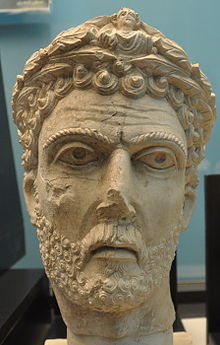Odaenathus
| Odaenathus |
|||||
|---|---|---|---|---|---|
| King of Palmyra King of Kings of the East (Western Aramaic: Mlk Mlk DY MDNH) |
|||||

Odenaethus' alleged bust
|
|||||
| King of Kings of the East | |||||
| Reign | 263–267 | ||||
| Predecessor | Title created | ||||
| Successor | Vaballathus | ||||
| King of Palmyra | |||||
| Reign | 260–267 | ||||
| Predecessor | Himself as Lord of Palmyra | ||||
| Successor | Vaballathus | ||||
| Ras (Lord) of Palmyra | |||||
| Reign | 240s–260 | ||||
| Predecessor | Office established | ||||
| Successor | Himself as King | ||||
| Born | c. 220 Palmyra, Syria |
||||
| Died | 267 (aged 46–47) Heraclea Pontica or Homs |
||||
| Spouse | Zenobia | ||||
| Issue |
Hairan I Vaballathus Hairan II |
||||
|
|||||
| Father | Hairan | ||||
| Full name | |
|---|---|
| Septimius Udaynath |
Septimius Udaynath, Latinized as Odaenathus (Palmyrene: ![]() ('Dynt), spelled Oḏainaṯ; Arabic: أذينة (Udhaynah); c.220–267), was the founder king (Mlk) of the Palmyrene Kingdom centered at Palmyra, Syria. He lifted his city from the position of a regional center subordinate to Rome into the supreme power in the East. Odaenathus was born into an aristocratic Palmyrene family who had received Roman citizenship in the 190s under the Severan dynasty. He was the son of Hairan the descendant of Nasor. The circumstances surrounding his rise are ambiguous; he became the lord (Ras) of the city, a position created for him, as early as the 240s and by 258, he was styled a consularis, indicating a high status in the Roman Empire.
('Dynt), spelled Oḏainaṯ; Arabic: أذينة (Udhaynah); c.220–267), was the founder king (Mlk) of the Palmyrene Kingdom centered at Palmyra, Syria. He lifted his city from the position of a regional center subordinate to Rome into the supreme power in the East. Odaenathus was born into an aristocratic Palmyrene family who had received Roman citizenship in the 190s under the Severan dynasty. He was the son of Hairan the descendant of Nasor. The circumstances surrounding his rise are ambiguous; he became the lord (Ras) of the city, a position created for him, as early as the 240s and by 258, he was styled a consularis, indicating a high status in the Roman Empire.
The defeat and captivity of emperor Valerian at the hands of the Persian Sassanian monarch Shapur I in 260 left the eastern Roman provinces largely at the mercy of the Persians. Odaenathus stayed on the side of Rome; assuming the title of king, he led the Palmyrene army and fell upon the Persians before they could cross the Euphrates to the eastern bank, and inflicted upon them a considerable defeat. Then, Odaenathus took the side of emperor Gallienus, the son and successor of Valerian, who was facing the usurpation of Fulvius Macrianus. The rebel declared his sons emperors, leaving one in Syria and taking the other with him to Europe. Odaenathus attacked the remaining usurper and quelled the rebellion. He was rewarded many exceptional titles by the emperor who formalized his self-established position in the East. In reality, the emperor could have done little but to accept the declared nominal loyalty of Odaenathus.
...
Wikipedia
